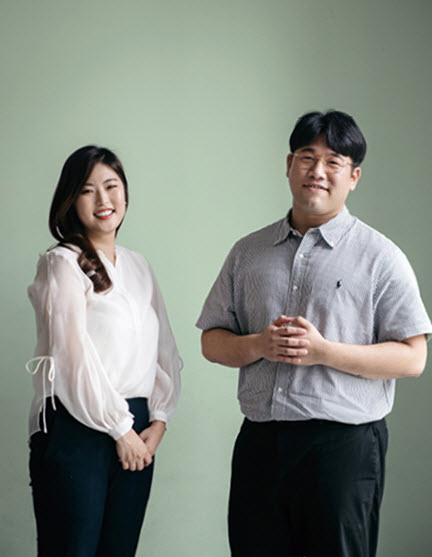
Ga-young Lim (Department of Aesthetics, Class of 2015) and Seul-ong Song (Department of Economics, Class of 2013)
Experiencing real social contribution
At the SNU College of Business Administration, you can find a large variety of professional associations where students can develop their sector expertise, as well as clubs where they can get together to share their common hobbies and interests. T-um (티움, meaning to bud or to sprout in Korean) is a club which combines both, a place where students gather to apply the theories they have learned through their studies to create social value. T-um’s mission is “Tangible Social Learning,” reflecting its aim to sprout a seed of hope in Korea through practical social contribution. T-um visits small businesses and provides consulting services that owners can use to better manage their establishments. When selecting a business to work with, the two most important qualities they look for are determination and good communication. In order to produce good results, it is important that businesses have the willingness to go the extra step, as well as the ability to overcome difficulties through mutual communication.
“The most memorable collaboration for me was with a small restaurant run by a couple. They weren’t attracting many customers, even though they had a solid concept of ‘home cooking’ and were using quality ingredients. T-um redesigned the menu to better fit their concept, and created a ‘care service zone’ with one side of the restaurant dedicated to offering over-the-counter medicines that you would find in any household.” Through T-um’s consulting service, the restaurant was able to solidify its concept, and sales naturally rose over time. Even with this valuable help however, there are no guarantees of long-term success in the business world. “This was at a time when the delivery market was starting to flourish. We gave them pointers on how to break into this market, but the owners were determined to focus on in-house dining. We have heard that they’ve recently been struggling, in part due to COVID-19 regulations, but dine-in revenue was already naturally decreasing with the general change in consumer habits. This is why long-term consulting is important, so it’s a shame that we can’t always continue to help these businesses.”
Providing the key to the problem
T-um’s consulting is based on expertise and credibility. T-um has developed strategies to establish a good rapport with their clients and facilitate a smooth project delivery, such as drawing up a business agreement. The process has not been without hardships however, because it is often difficult as students to earn the trust of local business owners. “One company refused all of our suggestions, which we had pored over for hours in our team meetings. I think they found it hard to trust us because we were students. We decided to take it as a challenge, and prove that our expertise could be relied on.”
To convince a business that wanted to relocate their shop to Gangnam, T-um members learned how to code, creating sales tables only seen on apps for better analysis. The impact of T-um’s work significantly enhanced the company’s sales and recognition, and the owners no longer felt the need to move the store. This project set a precedent for T-um’s signature problem solving method, with its two pillars of expertise and credibility.
What is it that T-um members gain from their work? “I recommend T-um to fellow students who want to change the world. Graduation, employment, promotion – we’re used to being in constant preparation for the next step. With T-um, you have the chance to make real contributions to the world with the skills that you’ve already developed so far, even if they’re not perfect. I think it’s a great opportunity to feel what kind of impact you can make on the world.”
Source: SNU People
Written by Minju Kim, SNU English Editor, minjukimm@snu.ac.kr
Reviewed by Professor Travis Smith, Department of Asian Languages and Civilizations, tlsmith@snu.ac.kr

